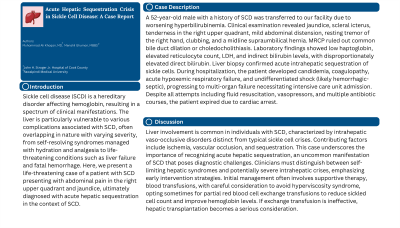Sunday Poster Session
Category: Liver
P1385 - Acute Hepatic Sequestration Crisis in Sickle Cell Disease: A Case Report
Sunday, October 27, 2024
3:30 PM - 7:00 PM ET
Location: Exhibit Hall E

Has Audio
- MK
Muhammad Ali Khaqan, MD
John H. Stroger, Jr. Hospital of Cook County
Lexington, KY
Presenting Author(s)
Muhammad Ali Khaqan, MD1, Menahil Ghuman, MBBS2
1John H. Stroger, Jr. Hospital of Cook County, Chicago, IL; 2Rawalpindi Medical University, Ontario, ON, Canada
Introduction: Sickle cell disease (SCD) is a hereditary disorder affecting hemoglobin, resulting in a spectrum of clinical manifestations. The liver is particularly vulnerable to various complications associated with SCD, often overlapping in nature with varying severity, from self-resolving syndromes managed with hydration and analgesia to life-threatening conditions such as liver failure and fatal hemorrhage. Here, we present a life-threatening case of a patient with SCD presenting with abdominal pain in the right upper quadrant and jaundice, ultimately diagnosed with acute hepatic sequestration in the context of SCD.
Case Description/Methods: A 52-year-old male with a history of SCD was transferred to our facility due to worsening hyperbilirubinemia. Clinical examination revealed jaundice, scleral icterus, tenderness in the right upper quadrant, mild abdominal distension, resting tremor of the right hand, clubbing, and a midline supraumbilical hernia. MRCP ruled out common bile duct dilation or choledocholithiasis. Laboratory findings showed low haptoglobin, elevated reticulocyte count, LDH, and indirect bilirubin levels, with disproportionately elevated direct bilirubin. Liver biopsy confirmed acute intrahepatic sequestration of sickle cells. During hospitalization, the patient developed candidemia, coagulopathy, acute hypoxemic respiratory failure, and undifferentiated shock (likely hemorrhagic-septic), progressing to multi-organ failure necessitating intensive care unit admission. Despite all attempts including fluid resuscitation, vasopressors, and multiple antibiotic courses, the patient expired due to cardiac arrest.
Discussion: Liver involvement is common in individuals with SCD, characterized by intrahepatic vaso-occlusive disorders distinct from typical sickle cell crises. Contributing factors include ischemia, vascular occlusion, and sequestration. This case underscores the importance of recognizing acute hepatic sequestration, an uncommon manifestation of SCD that poses diagnostic challenges. Clinicians must distinguish between self-limiting hepatic syndromes and potentially severe intrahepatic crises, emphasizing early intervention strategies. Initial management often involves supportive therapy, blood transfusions, with careful consideration to avoid hyperviscosity syndrome, opting sometimes for partial red blood cell exchange transfusions to reduce sickled cell count and improve hemoglobin levels. If exchange transfusion is ineffective, hepatic transplantation becomes a serious consideration.
Disclosures:
Muhammad Ali Khaqan, MD1, Menahil Ghuman, MBBS2. P1385 - Acute Hepatic Sequestration Crisis in Sickle Cell Disease: A Case Report, ACG 2024 Annual Scientific Meeting Abstracts. Philadelphia, PA: American College of Gastroenterology.
1John H. Stroger, Jr. Hospital of Cook County, Chicago, IL; 2Rawalpindi Medical University, Ontario, ON, Canada
Introduction: Sickle cell disease (SCD) is a hereditary disorder affecting hemoglobin, resulting in a spectrum of clinical manifestations. The liver is particularly vulnerable to various complications associated with SCD, often overlapping in nature with varying severity, from self-resolving syndromes managed with hydration and analgesia to life-threatening conditions such as liver failure and fatal hemorrhage. Here, we present a life-threatening case of a patient with SCD presenting with abdominal pain in the right upper quadrant and jaundice, ultimately diagnosed with acute hepatic sequestration in the context of SCD.
Case Description/Methods: A 52-year-old male with a history of SCD was transferred to our facility due to worsening hyperbilirubinemia. Clinical examination revealed jaundice, scleral icterus, tenderness in the right upper quadrant, mild abdominal distension, resting tremor of the right hand, clubbing, and a midline supraumbilical hernia. MRCP ruled out common bile duct dilation or choledocholithiasis. Laboratory findings showed low haptoglobin, elevated reticulocyte count, LDH, and indirect bilirubin levels, with disproportionately elevated direct bilirubin. Liver biopsy confirmed acute intrahepatic sequestration of sickle cells. During hospitalization, the patient developed candidemia, coagulopathy, acute hypoxemic respiratory failure, and undifferentiated shock (likely hemorrhagic-septic), progressing to multi-organ failure necessitating intensive care unit admission. Despite all attempts including fluid resuscitation, vasopressors, and multiple antibiotic courses, the patient expired due to cardiac arrest.
Discussion: Liver involvement is common in individuals with SCD, characterized by intrahepatic vaso-occlusive disorders distinct from typical sickle cell crises. Contributing factors include ischemia, vascular occlusion, and sequestration. This case underscores the importance of recognizing acute hepatic sequestration, an uncommon manifestation of SCD that poses diagnostic challenges. Clinicians must distinguish between self-limiting hepatic syndromes and potentially severe intrahepatic crises, emphasizing early intervention strategies. Initial management often involves supportive therapy, blood transfusions, with careful consideration to avoid hyperviscosity syndrome, opting sometimes for partial red blood cell exchange transfusions to reduce sickled cell count and improve hemoglobin levels. If exchange transfusion is ineffective, hepatic transplantation becomes a serious consideration.
Disclosures:
Muhammad Ali Khaqan indicated no relevant financial relationships.
Menahil Ghuman indicated no relevant financial relationships.
Muhammad Ali Khaqan, MD1, Menahil Ghuman, MBBS2. P1385 - Acute Hepatic Sequestration Crisis in Sickle Cell Disease: A Case Report, ACG 2024 Annual Scientific Meeting Abstracts. Philadelphia, PA: American College of Gastroenterology.
